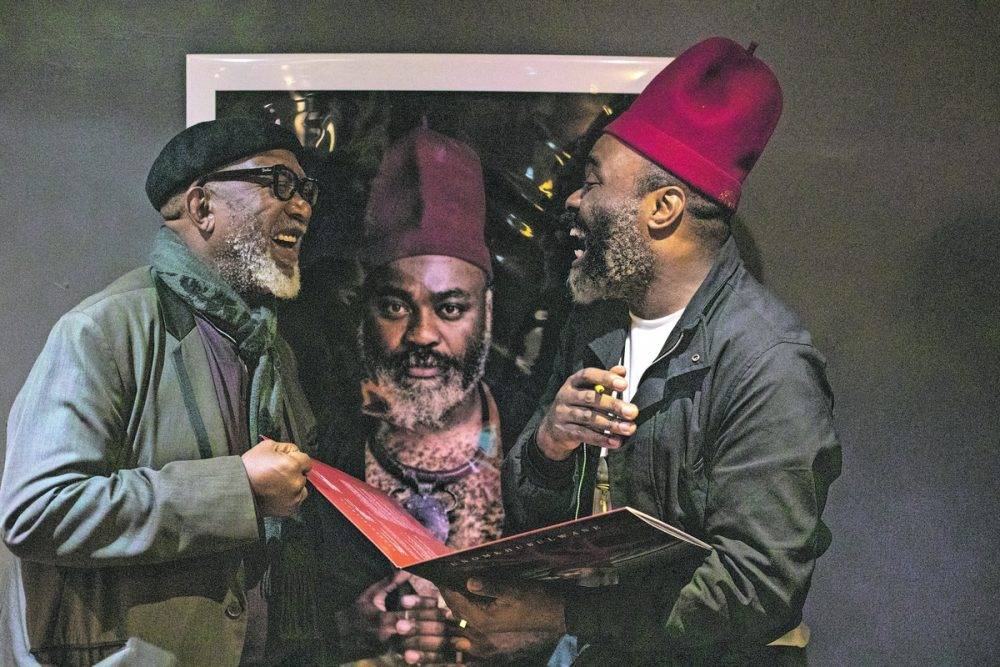Heritage: Nduduzo Makhathini, the South African pianist, composer and educator, brings his Zulu culture to bear on his new album uNomkhubulwane. Photo: Arthur Dlamini
Following on Modes of Communication: Letters from the Underworlds (2020) and In the Spirit of Ntu (2022), in his third release, uNomkhubulwa, South Africa’s internationally acclaimed pianist, composer, educator Nduduzo Makhathini offers 11 original compositions in his highly personal form of transcendent spiritual jazz inspired by his ancestral connections and mentors Bheki Mseleku, Abdullah Ibrahim, John Coltrane and McCoy Tyner, among others.
Performing with a remarkable rhythm section consisting of bassist Zwelakhe-Duma Bell le Pere and drummer Francisco Mela, Makhathini’s trio delivers a delicately balanced, seamless interplay of immersive jazz grounded in his Zulu cultural heritage and cosmology.
The album showcases the prowess of each artist’s mastery of their instrument and the communicative power and finesse of truly sensitive, close-knit, mutually supportive improvisatory ensemble playing.
Sung and spoken incantations by Makhathini, sometimes embellished with back-up vocals by Mela and Bell le Pere, enrich the soundscape and add to the music’s uniqueness (translations of these in the liner notes would have been a plus).
The interaction among the three musicians creates a buoyant, compelling energy, often contemplative and gentle, sometimes hard-driving and always propelled and undergirded by the insistent, precise layered drumming of Mela.
Full of purpose, Makhathini’s compositions are intended to invoke “collective memory” while they promote a “new humanism”. They are suffused with optimism and hope as they convey the possibility of abundance and social balance inherent in Zulu cosmology as a corrective to the “lack” experienced by Africans since the colonial encounter.
This offering grew out of Makhathini’s experience in becoming a fully initiated Zulu sangoma as each composition evolved from the “mother song” he received from uNomkhubulwane during the ritual water immersion of his initiation, as the sign of his readiness as a healer.
In Zulu cosmology, uNomkhubulwane is the mythical only daughter of the creator, the rain goddess, provider of fertility, abundance and balance.
The music is presented in three movements envisioned as an “open rehearsal” of uNomkhubulwane’s song, an adventure in improvisatory music meant to be transcendent.
Movement One has three tracks. The first, Omnyama opens with Makhathini speaking in Zulu over gentle melodic material; he is asking uNomkhubulwane if it is possible to go back to the beginning, to the original primal sound, the qa click of Nguni languages, to find the way forward in our troubled world. He breaks into impassioned singing over a repetitive melodic motif, searching to connect with the goddess.
 A noteworthy meeting: Jazz musicians Sipho ‘Hotstix’ Mabuse (left) and Nduduzo Makhathini. Photo: Arthur Dlamini
A noteworthy meeting: Jazz musicians Sipho ‘Hotstix’ Mabuse (left) and Nduduzo Makhathini. Photo: Arthur Dlamini
Tracks two and three, Uxolo and Kwakhangelamankengana, carry the invocation of the unspeakable.
Movement Two: Water Spirits (tracks four to seven) proposes cleansing of the Atlantic of the violations of the slave trade through summoning of “essence” and restoration of the vital force Ntu.
Makhathini suggests there is an urgent need to re-imagine the waters of the Atlantic as the womb of uNomkhubulwane, a site for collective healing rituals.
This work involves connecting from both sides of the Atlantic through the legacy of sound embodied in the ancestral DNA of jazz and its power to activate collective memory.
These “heavy” thoughts shared by Makhathini in the liner notes resonate and inspire as they convey his depth of purpose for this music.
Movement Two opens with Izinkonjana, a slow-tempo ballad rooted in familiar rhythmic and melodic sounds of South African jazz as Makhathini seemingly pays homage to his origins in this idiom.
The music in this movement is not confined to meter in the conventional sense — time is allowed to expand and contract, to flow with the improvisations.
It closes with Iyana, an offering for the water spirit uNomkhumbulwane in which Makhathini shifts between singing and speaking as he addresses the rain goddess. His vocalisations on this track and many others are gentle but at the same time often impassioned in ways that show this music is meant to communicate spiritually.
The third movement, Inner Attainment (tracks eight to 11), presents Makhathini’s musical vision of an “elsewhere”, full of freedom, hope and grace that provides transcendence through the ability to co-create the world we wish for.
Track eight, Izibingelelo, opens with a beautiful melodic motif reminiscent of Joaquin Rodrigo’s Concierto de Aranjuez. It conveys a feeling of love and respect that transcends as it moves into intense improvisation.
On the following two tracks Makhathini again intersperses vocalisation with intense instrumental work that has a sense of urgency. The album closes with a lyrical ballad-like composition Ithemba, which evokes a sense of completion.
Makhathini has used the number three variously into this album as a way to integrate the music with the importance of three in African cosmology generally and to the rain goddess uNomkhubulwane (fertility, abundance, balance); to the ancestors, those alive and those yet to be born; presentation as a three-movement suite; in use of the triplet feel and ¾ time signature for some of the compositions, the pyramid bridging the Atlantic in that the members are from South Africa, Cuba and the US.
With his compositions for uNomkhubulwane, Makhathini has created a soulful tribute to his Zulu heritage with stunning depth of meaning and musicality. Its free-form flow of improvisations from kernels of composition, reminiscent of free jazz, is inspired and inspiring.
His achievement is an example of energy placed rightly between wholeness and purpose. Makhathini is a gifted musician and composer who understands music’s power to heal. His star is rising into the firmament of South Africa jazz greats.
Give uNomkhubulwane a listen, this is great music given to us by great musicians.
• Professor Emerita Diane Thram is the former director of the International Library of African Music at Rhodes University.
• Listen and purchase music here.